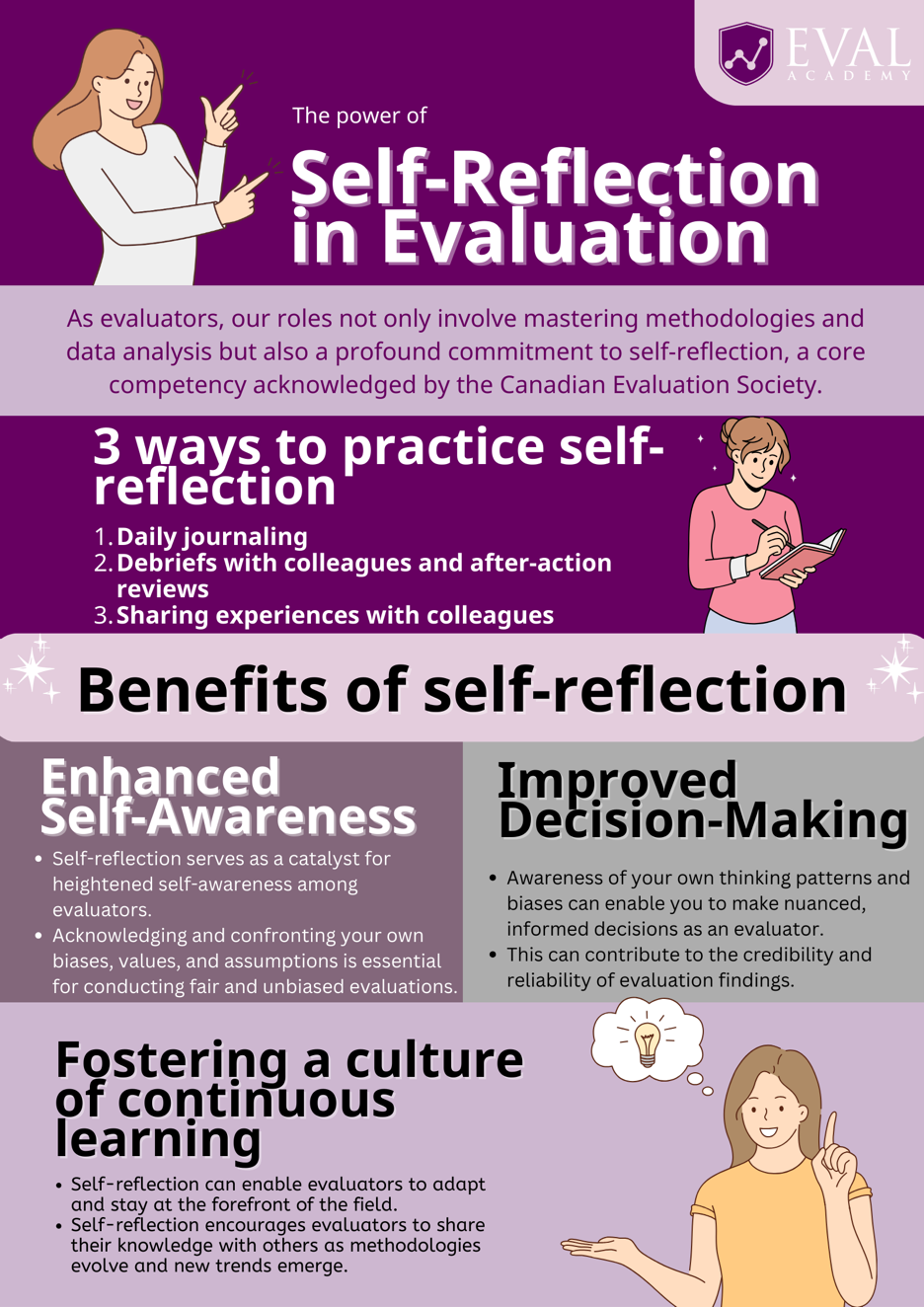This is an Eval Central archive copy, find the original at evalacademy.com.
This article is rated as:



As we approach the end of 2023, it’s more than likely that you’ll find yourself reflecting on the past year. As evaluators, our roles not only involve mastering methodologies and data analysis, but also a profound commitment to self-reflection, a core competency acknowledged by the Canadian Evaluation Society. In my recent presentation at the Canadian Evaluation Society, British Columbia Chapter (CESBC) annual conference, the transformative power of self-reflecting as an evaluator took center stage as I reflected on my journey of moving from an emerging evaluator to a more seasoned one.
This article explores the insights I shared during the CESBC presentation, emphasizing the pivotal role of reflection in the evaluation process.
Understanding Self-Reflection in Evaluation:
As evaluators, our main goal is to evaluate programs and projects, to uncover insights and evidence essential for informed decision-making. Yet, the transition from theoretical understanding (knowing what should be done) to practical implementation (actually doing it) in the field of evaluation frequently includes challenges. My personal experience aligns with this struggle, having embarked on my first-ever evaluation project 6 years ago without the benefit of formal education or training, or even knowing what evaluation is! In this journey (of which I know I’m not alone!) self-reflection emerges as a powerful tool, bridging the gap between theoretical knowledge and effective execution.

For me, I’ve found that self-reflection can occur in multiple forms in my role as an evaluator. Here are some of the ways that I’ve practiced reflection:
-
Daily journaling to write down what went well for the day, challenges, and ideas to improve my practice. This can provide a tangible record of growth, serving as a valuable resource for future projects.
-
Debriefs with colleagues and practicing after-action review processes at the end of an evaluation.
-
Contributing to Eval Academy by writing articles and creating content focused on lessons learnt from my own practice.
-
Reading the experiences of my colleagues through their contributions to Eval Academy.
Below, I’ve included some of the benefits I’ve witnessed by integrating self-reflection into my practice as an evaluator:
1. Enhanced Self-Awareness:
Self-reflection serves as a catalyst for heightened self-awareness among evaluators. Acknowledging and confronting your own biases, values, and assumptions becomes essential for conducting fair and unbiased evaluations. This foundational step lays the groundwork for excellence in evaluation.
2. Improved Decision-Making:
I’ve found that making time for self-reflection has allowed me to be better equipped to make decisions. Evaluations can be complex processes with multiple partners and competing priorities. Awareness of my own thinking patterns and biases enables me as an evaluator to make nuanced, informed decisions. This, in turn, can contribute to the credibility and reliability of evaluation findings.
3. Fostering a Culture of Continuous Learning:
As evaluation methodologies evolve and new trends emerge, self-reflection positions evaluators to adapt and stay at the forefront of the field and share their knowledge with others to foster a culture of continuous learning in the field.
My CESBC presentation on the power of self-reflecting as an evaluator is a call to action for evaluators at all career stages. By embracing self-reflection, evaluators can enhance self-awareness, improve decision-making, and contribute to a culture of continuous learning. The journey from theory to action becomes more seamless, ensuring that evaluations not only assess external programs but also turn the evaluative lens inward for a comprehensive and impactful professional journey.
As the field of evaluation continues to evolve, the lessons from my CESBC presentation and platforms like Eval Academy encourage evaluators to embrace self-reflection as an integral part of their professional toolkit, fostering a community that thrives on continuous learning and collective wisdom.